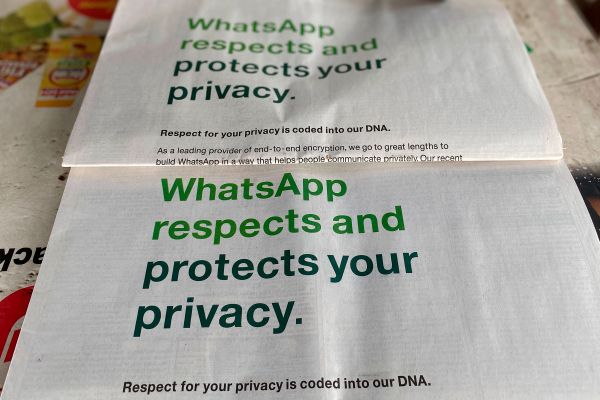India said on Wednesday that WhatsApp’s lawsuit challenging the new local IT rules is an “unfortunate last moment” attempt to prevent new regulations from going into effect in “a clear act of defiance,” and said the Facebook-owned service hadn’t raised any specific objection about the traceability requirement in writing in more than two and a half years.
Ravi Shankar Prasad, India’s Electronics and IT Minister, said WhatsApp’s refusal to comply with the guidelines, the deadline of which expires Wednesday, is a “clear act of defiance of a measure whose intent can certainly not be doubted.”
WhatsApp sued the Indian government earlier on Wednesday in a Delhi court, saying the world’s second-largest internet market’s new IT rules could allow authorities to make people’s private messages “traceable,” and conduct mass surveillance.
The Ministry of Electronics and IT said the government needs to trace the first originator of a message for the “purposes of prevention, investigation, punishment etc. of inter alia an offence relating to sovereignty, integrity and security of India, public order incitement to an offence relating to rape, sexually explicit material or child sexual abuse material punishable with imprisonment for not less than five years.”
“It is in public interest that who started the mischief leading to such crime must be detected and punished. We cannot deny as to how in cases of mob lynching and riots etc. repeated WhatsApp messages are circulated and recirculated whose content are already in public domain. Hence the role of who originated is very important.”
India first proposed WhatsApp to deploy software changes to make the originator of a message traceable in 2018. The suggestion came at a time when WhatsApp was grappling with containing the spread of false information in India, where circulation of such hoaxes resulted in multiple real-life casualties. The suggestion became a part of the new rules in February this year.
WhatsApp has argued that the end-to-end encryption it offers to users — a move that security and policy experts have long praised — makes it impossible for the firm, used by more than 2 billion users worldwide, to find identifying information about a user.
India is the largest market by users for the Facebook-owned popular instant messaging service. According to a government estimate, WhatsApp has amassed over 530 million users in India.
The Ministry of Electronics and IT said any company’s operations in India is “subject to the law of the land,” and argued that similar or tougher regulations have been enforced or proposed in other markets.
“What India is asking for is significantly much less than what some of the other countries have demanded,” it said, adding that it would be “foolhardy” to doubt the objective of the new rules.
On one hand, “WhatsApp seeks to mandate a privacy policy wherein it will share the data of all its user with its parent company, Facebook, for marketing and advertising purposes,” the ministry added. “On the other hand, WhatsApp makes every effort to refuse the enactment of the Intermediary Guidelines which are necessary to uphold law and order and curb the menace of fake news.”
The ministry wrote to social media firms earlier on Wednesday to ask for an update on whether they had complied with the new rules, TechCrunch first reported. In the letter, the ministry sought information (name and contact address) of officials who the firms had appointed as part of the compliance to the new rules that require officers to be available on the ground to address local concerns.
“WhatsApp’s attempt to portray the Intermediary Guidelines of India as contrary to the right to privacy is misguided. […] The Government of India recognises that ‘Right to Privacy’ is a Fundamental right and is committed to ensure the same to its citizens,” the ministry said in a statement.
